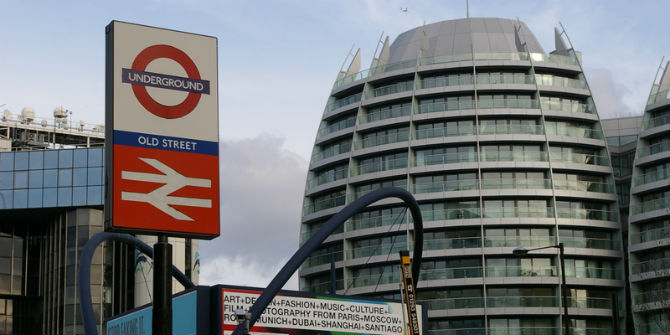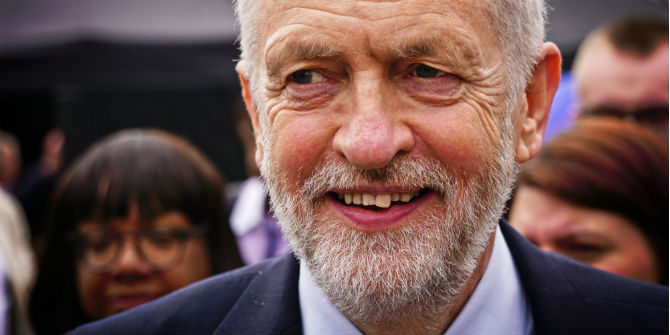 What will the economic impact of Theresa May’s deal be? And how does it compare to the no-deal scenario? The LSE’s Centre for Economic Performance, in association with The UK in a Changing Europe, has modelled both scenarios and examined the effects on migration, fiscal policy, trade and productivity. The authors – Anand Menon, Jonathan Portes (King’s College London), Peter Levell (Institute for Fiscal Studies) and Thomas Sampson (LSE) – also look at the relative cost of the ‘divorce bill’ – the payments the UK has agreed to make to the EU.
What will the economic impact of Theresa May’s deal be? And how does it compare to the no-deal scenario? The LSE’s Centre for Economic Performance, in association with The UK in a Changing Europe, has modelled both scenarios and examined the effects on migration, fiscal policy, trade and productivity. The authors – Anand Menon, Jonathan Portes (King’s College London), Peter Levell (Institute for Fiscal Studies) and Thomas Sampson (LSE) – also look at the relative cost of the ‘divorce bill’ – the payments the UK has agreed to make to the EU.
Our modelling leads us to estimate that the Brexit deal could reduce UK GDP per capita by between 1.9% and 5.5% in ten years’ time, compared to remaining in the EU. The cost to the public finances would be between 0.4% and 1.8% of GDP over the same period, and the corresponding figures for a no deal Brexit would be 1% to 3.1%.

Taken together, the estimates imply that no deal would, in the long term (ignoring the impacts of short-term disruption), lead to a reduction in UK GDP per capita, compared to the ‘baseline’ of remaining an EU member, of 3.5% to 8.7%—the large range reflecting the very substantial uncertainties involved. The negative impact of the proposed deal would be smaller, but still substantial, amounting to between 1.9% and 5.5% of GDP per capita.
Such a large economic impact would also have major implications for the public finances. These would far outweigh any gains resulting from reduced EU contributions. The Institute for Fiscal Studies has estimated that if the impacts on GDP were as estimated above, then in a no deal scenario the cost to the public finances would be between 1% and 3.1% of GDP, and between 0.4% and 1.8% if the deal was implemented. This is even after taking account of the long-term saving on the UK’s net EU contributions of 0.4% of GDP.
Clearly, these figures are significant. Clearly, too, their impact would be felt over time. For all the talk about a Brexit ‘cliff edge,’ should the withdrawal agreement be signed and subsequently ratified (admittedly a big if at the moment), the UK would continue to trade with the EU on essentially the same terms until the end of the transition period. Only thereafter would the practical impact of Brexit be felt.
Nevertheless, our findings imply challenges ahead for policy makers. The scale of impact that we have estimated will make it harder to achieve key public policy objectives. Difficult choices, particularly about taxation and spending, will have to be made. And there is little if any sign that the starkness of these choices has yet been appreciated, not least by the two main political parties, both of whose manifestos for the 2017 seemed to imply that a post-Brexit world would be one of business as usual.
We should of course stress that our results are subject to a high degree of uncertainty, relating both to the inherent difficulties in economic modelling, and to the vague and aspirational nature of the Political Declaration on the future relationship, which mean that some key elements are still to be determined. Moreover, we do not attempt to model the short-term disruption resulting from no deal, which was the subject of an earlier UK in a Changing Europe report, Cost of No Deal Revisited.
Moreover, our work is based on a number of assumptions, some of them subjective, which are set out clearly and transparently. A central estimate from the empirical literature is that a 1% decline in trade reduces income per capita by around 0.5%. To estimate the implications for the government finances, we assume that a 1% fall in GDP per capita reduces government revenue by 0.4% of GDP. The conclusions of the report are consistent with both economic theory and the empirical literature.
We carried out this exercise because we believe the public and political debates to come should be informed by the best available analysis of what the deal on offer actually means. We do not take any position of which of the three scenarios we examine is preferable. There are many other considerations than simply economic ones, and the role of our organisation is to provide evidence and not to tell people what to make of it.
However, we believe that not enough attention has been paid in the debate over Brexit to the trade-offs it implies. The profusion of ‘cakeism’ has meant that leading Brexiters have been unwilling to discuss what price is worth paying in order that the UK leave the EU. A necessary first step in any such debate is knowing what that price might turn out to be. We believe our estimates provide a clear indication of the broad scale of the impact of the deal negotiated by the Prime Minister.
This post represents the views of the authors and not those of the Brexit blog, nor the LSE. The full report is available here.







It is interesting that the three key reports issued recently by LSE’s CEP, the Treasury, and the Bank of England all agree on the essentials, if not the details. That is a) No Deal – Bad b) May’s Deal – Less Bad c) No Brexit -Best.
The Brexiteers’ instant retort is “Look how wrong these forecasters were at the time of the referendum. They will no doubt be wrong again.”
As I see it, the Brexiteers main fault is that they are arguing for an instant crash that takes place in a day or two. Instead, the effects as I see it, are likely to be more like air going out of a balloon. There will be a steady less pronounced deterioration over time, with the biggest blip occurring at that time when, and if, the UK can be seen to have clearly left the EU customs union and single market.
Just like when I chose to use my hard earned democratic vote at the the time, this time as well as last time I did my research, as far as is reasonable.
In May 2016 Mark Carney to the frustration of many leave politicians, said that if the vote ( not the action of leaving ) went to leave, then the U.K. economy will enter a recession that would dwarf that caused by the banks.
That did not happen.
The OBR also said just before the vote that the pound would crash to below an exchange rate of below one pound to the euro.
That didn’t happen.
Yes the pound is weak today , but that is manipulated to ensure the U.K. economy ( exports ) are competitive.
But let us not forget the pound crashing to 1.07 in September 2008,
1.05 in August 2012.
I suppose that was because of Brexit (not)
According to Whitehall, unemployment would increase by 850,000 immediately after the vote.
That didn’t happen.
We have heard all these project fear propaganda’s before.
They use the words cliff edge, crash and mayhem.
airplanes falling from the skies.
I even remember them saying England could not play football in Europe. ( I thought there’s a positive )
These are used by project fear to twist our minds.
I won’t fall for it, I can think for myself.
Why is it that no one appears to factor in the positives of leaving without a deal?
The taxes to be paid to uk government by Europe will bring billlions to the economy, the 39 billion could be used to for schools and hospitals around the U.K..
Subsidies can be paid to British industry including steel, cars, science and development. ( currently illegal under Eu rules.
The import taxes from those countries that we do not have a free trade agreement with.
Do not be afraid of walking away a no deal is a good deal.
But if we were strong enough to walk away, we would get the right deal, because the biggest looser would be Europe and they know it.
The only reason that in the uk we are fighting each other is because we have an open press and forum.
It sells news papers.
We wash out dirty linen in the open arena. Europe do not.
Very American like!!!!!
Ohhh
Forgot that mention that trusted and reliable chancellor George Osborne.
House prices to fall 20%
Emergency budget to increase taxes by 15%
Pants on fire!!!!!!